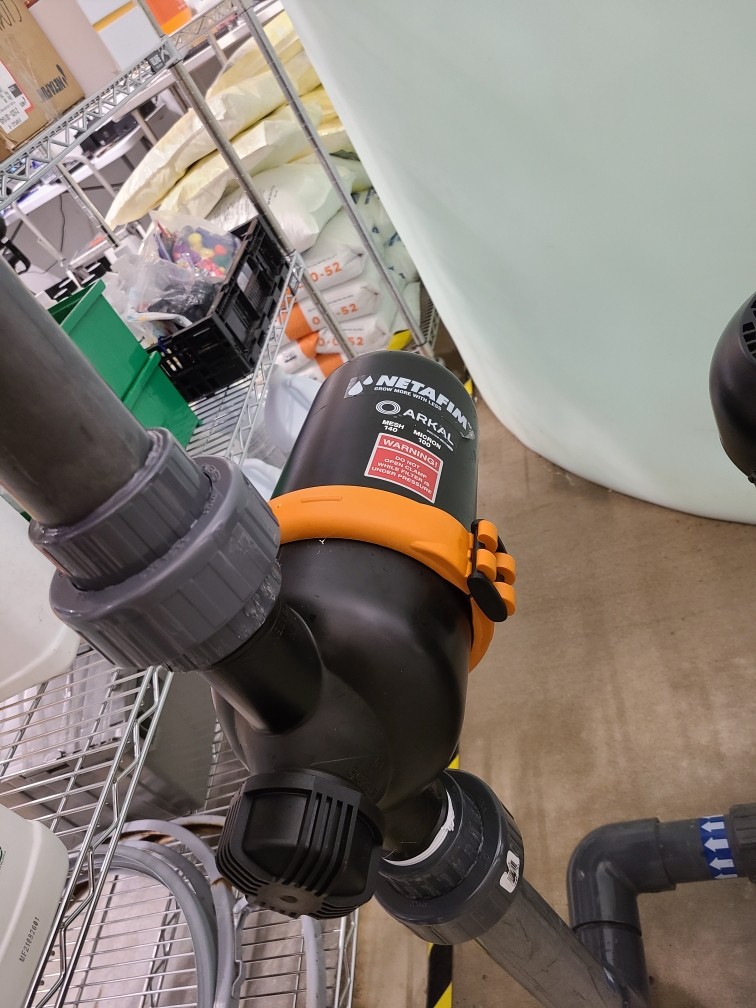Water Filters for Commercial Hydroponics

Water Filters for Greenhouse Irrigation
At Integrated Water Process, we believe that every single component of your commercial hydroponic water irrigation system not only needs to be efficient and reliable enough to ensure the continual smooth running of your controlled environment agriculture (CEA) operation. This includes water filtering systems so that your plants receive consistent clean water to ensure healthy growth, bountiful yields, and ultimately, a high quality end-product.
Benefits of Water Filters
Enhanced Plant Health
Water filters play a foundational role in maintaining optimal water quality. This is evident as it is often the first step in a water treatment process and designed to remove sediment, organic debris, Volatile Organic Compounds (VOCs), and other contaminants such as chlorine, fluorine, and heavy metals that can negatively affect plant health or its consumers. By ensuring a clean and balanced nutrient solution, filters promote healthier plants with improved resistance to diseases and environmental stressors.
Protection of Hydroponic System Components
The water filters in your hydroponic system also serve to promote longevity and safeguard the functionality of all downstream mechanical system components, such as pumps, valves, sensitive instruments, and drip irrigation emitters. By removing particulates and sediments from the system, filters prevent clogging and buildup, reducing the risk of equipment malfunction and downtime. Filters ensure uninterrupted operation of the hydroponic system, minimizing maintenance time and costs and thereby maximizing productivity in commercial cultivation environments.
Got a question about water filters?
Contact us today to talk directly to one of our experts and discover how we can help you decide on the correct water filter for your CEA cultivation facility. Click the button below to schedule an appointment.
What type of Water Filtration Systems do you need?
In large-scale commercial CEA greenhouses and indoor cannabis growing facilities, several types of water filters are commonly used to ensure water quality and controlled nutrient delivery. We offer a wide range of water filtration solutions, including:
Reverse Osmosis (RO) Systems
Reverse osmosis filtration Systems utilize a semipermeable membrane designed to remove smaller particle sizes and ions. When paired with pre-filtration, RO systems are highly effective at producing clean and purified water suitable for hydroponic cultivation. They can be highly effective in removing a wide range of impurities from water, including salts, minerals, metals, ions, organic compounds, bacteria, and viruses. These systems are commonly used in various applications such as drinking water purification, wastewater treatment, desalination of seawater, and production of ultra-pure water for other industrial processes.
While RO produces high-quality purified water, it also consumes a significant amount of energy and generates a concentrated stream of rejected contaminants known as brine. Proper disposal or treatment of this brine stream is essential to minimize environmental impact. Additionally, RO systems require regular maintenance to ensure optimal performance and minimal rejection rates. This includes membrane cleaning and replacement as needed. Despite these considerations, RO remains one of the most reliable and efficient methods for producing clean, purified water for a wide range of applications.
Fine Particle Filtration
Often referred to as pre-filters, or sediment filters, fine particle filters are designed to capture and remove particulates, sand, silt, and other suspended solids from the water down to one micron in size. This initial filtration stage acts as the guardian, intercepting the largest contaminants before they have a chance to compromise the efficiency and longevity of subsequent filters or equipment within the hydroponics system. Examples of fine particle filtration systems include: Screen Filters, Sand Media Filters, Disc Filters, Centrifugal Filters, etc.

Micro-Filtration (MF)
Micro-Filtration represents an advanced stage of irrigation filtration, refining the process initiated by fine particle filtration. While functionally similar to its predecessor, microfiltration delves deeper, targeting even smaller contaminants that may have escaped previous filtration stages. This precision makes it an invaluable component in filtration systems where purity and quality are paramount. Examples of fine particle filtration systems Include: Depth Filters, Cartridge Filters, Fine Mesh Screen Filters, Etc.
Ultrafiltration (UF)
UF operates on the principle of size-based exclusion, where a semi-permeable membrane with precise pore sizes is employed to selectively allow the passage of certain components while retaining others. UF is a membrane filtration process similar to reverse osmosis in that the process requires pressure to push water through a membrane that is semi-permeable. This membrane acts as a barrier to suspended solids, bacteria, viruses, and other pathogens, yielding water of high purity. This filtration process is part of a family of pressure-driven membrane processes, including microfiltration (MF), nanofiltration (NF), and reverse osmosis.
Nanofiltration (NF)
While RO typically rejects almost all dissolved solutes, including both multivalent and monovalent ions, nanofiltration exhibits high rejection of multivalent ions like calcium while allowing monovalent ions such as chloride to pass through more freely. This selective rejection makes nanofiltration ideal for applications where the removal of specific ions or compounds is desired while maintaining others in the treated liquid. Nanofiltration is commonly used for water softening, desalination, and the removal of certain contaminants from water sources.
In summary, by combining these various types of water filters and filtration systems, large-scale controlled environment agriculture facilities can establish comprehensive water management programs and protocols for their specific cultivation requirements. This ensures impressive and consistent crop yields while also reducing your water, nutrient, and additive footprint and associated costs.
Critical things to take into consideration when choosing the best water filtration system
The best filtration system will always be specific to the operators requirements and will rarely ever be one filter type. The process starts by knowing the size and quantity of particulates suspended or dissolved in your source water. The next step is determining what needs to be removed to accomplish your cultivation ambitions. Deploying water filter technology is required for indoor growers and greenhouse operators seeking optimal crop health and water system reliability.
Upstream Nutrient Solution Improvement
The quality of your Fresh Water Supply (FWS) directly impacts the nutrient solution quality delivered in hydroponic systems, making it a critical factor. Investing in a purpose-built filtration system ensures that only the purest water reaches your plants, free from contaminants that could hinder growth or introduce potentially harmful pathogens!
Ensure End-Product Purity
We offer efficient and economic purification capabilities. These filtration systems are designed and engineered to remove a wide range of impurities, including chlorine, heavy metals, sediment, and microbial contaminants. Most specifically, for the horticultural and cannabis industry. The removal of these l contaminants ultimately results in a cleaner high-value plant-derived product that should easily pass the most rigid state-mandated testing.
By eliminating detrimental substances, high-quality water filters provide a clean and stable water supply, optimizing nutrient uptake and minimizing the risk of nutrient imbalances or toxicities in the hydroponic solution and eventually in end-products.
Durability and Reliability
Our durability and reliability hydroponic water filter systems are built with precision engineering and high-quality materials, our recommended filters are designed to withstand the demands of continuous operation in hydroponic environments.Robust construction ensures longevity and consistent performance, reducing the need for frequent maintenance or replacement and providing growers with peace of mind knowing that their filtration system can be relied upon day in and day out.
Sustainability
Additionally, investing in hydroponic water filter technology aligns with principles of sustainability and environmental stewardship. By choosing filters that efficiently remove contaminants and promote water conservation, growers can minimize their ecological footprint and contribute to a more eco-friendly cultivation process. Reduced water waste, coupled with optimized nutrient delivery, not only benefits the environment but also leads to cost savings over time.
Let’s talk about water filters!
Contact our in-house team to discuss your water filtration needs and discover how our specialized expertise can benefit your CEA greenhouse or cannabis grow facility. Book a free consultation by clicking the button below to schedule an appointment.
